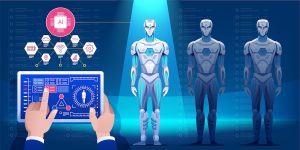
Generative AI has only been a major player in the tech landscape for a few transformative years, yet its rapid adoption has made a seismic impact. As we approach 2025, the question is no longer whether generative AI will shape the future, but how far it will go and in what new directions it will evolve.
The following predictions explore this possible evolution for generative AI in 2025 in the areas of inference, tangible business value and results, and agentic AI.
Improving Inference Becomes the Focus
Ian Buck, VP of hyperscale and HPC at Nvidia, says as AI models grow in size and complexity, the demand for efficient inference solutions will increase.
“The rise of generative AI has transformed inference from simple recognition of the query and response to complex information generation — including summarizing from multiple sources and large language models such as OpenAI o1 and Llama 450B — which dramatically increases computational demands,” he says. “Through new hardware innovations, coupled with continuous software improvements, performance will increase, and total cost of ownership is expected to shrink by 5x or more.”
 Jared Quincy Davis, a Deepmind alum and Founder and CEO of AI infrastructure firm Foundry, says we are starting to see a major shift in AI development, moving from building models to actually using and adapting them. He predicts that 2025 will be the year of inference, with AI developers moving from fundamentals to action. Training and pre-training will become table stakes; putting the models to work doing inference for useful applications that drive adoption will be the focus.
Jared Quincy Davis, a Deepmind alum and Founder and CEO of AI infrastructure firm Foundry, says we are starting to see a major shift in AI development, moving from building models to actually using and adapting them. He predicts that 2025 will be the year of inference, with AI developers moving from fundamentals to action. Training and pre-training will become table stakes; putting the models to work doing inference for useful applications that drive adoption will be the focus.
Bhavani Vangala, VP of Engineering at medtech SaaS firm Onymos, says, “The next wave of generative AI model training in 2025 is set to be transformative, focusing on enhancing reasoning and inference capabilities to make AI responses more intuitive and aligned with human thought processes. OpenAI’s recent release of models like o1-preview models this shift, demonstrating significant improvements in inference and reasoning abilities. These advancements enable AI to process and respond to prompts with increased coherence and contextual awareness, marking a promising step forward.”
“2025 will be the year a lot of computation begins to shift to inference at the edge. Applications will need hundreds of thousands of tokens for a single query, as small language models make one query after another in microseconds before churning out an answer,” predicts Nvidia Senior Research Scientist, AI Agents, Linxi (Jim) Fan.
GenAI Honeymoon Will Be Over
Some experts believe we will enter a period of backlash against generative AI. Claus Jepsen, chief product and technology officer at enterprise software firm Unit4, says tech leaders will become increasingly cautious with generative AI, realizing the risks of exposing proprietary data to LLMs. Jepsen also predicts businesses will return to automation as a lower-stakes technology to improve user experience.
 Ocient’s Chris Gladwin agrees: “Although the vast majority of organizations still plan to invest in AI next year, leaders now face pressure to show tangible business value. With traditional data systems overwhelmed by growth in sensor, IoT, and network data, Predictive AI and machine learning will become essential for cost-effective, data-driven decision-making,” the Ocient CEO said. “Enterprises will now measure AI by its direct impact on business goals. Those that leverage predictive technologies to streamline insights and drive efficiency will lead in the new era where AI’s worth is defined not only by innovation alone but by meaningful results on the bottom line.”
Ocient’s Chris Gladwin agrees: “Although the vast majority of organizations still plan to invest in AI next year, leaders now face pressure to show tangible business value. With traditional data systems overwhelmed by growth in sensor, IoT, and network data, Predictive AI and machine learning will become essential for cost-effective, data-driven decision-making,” the Ocient CEO said. “Enterprises will now measure AI by its direct impact on business goals. Those that leverage predictive technologies to streamline insights and drive efficiency will lead in the new era where AI’s worth is defined not only by innovation alone but by meaningful results on the bottom line.”
In 2025, AI investments will shift decisively from experimentation to execution, says Crunchbase CPO Megh Gautam.
“While 2022-2024 saw companies making splashy AI announcements and conducting broad and, in some cases, performative experiments, 2025 will mark the year when AI must prove its ROI. Companies will abandon generic AI applications in favor of targeted solutions that solve specific, high-value business problems,” Gautam says. “This transition will end the era of ‘AI theater’ – where companies invested in AI primarily for publicity – and usher in a new phase where AI becomes a serious, measurable business function with clear performance metrics and accountability.”
Gautam also predicts that by the end of 2025, businesses will measure AI success not by headlines or awards but by “boring” metrics like reduced operating costs, improved compliance rates, and enhanced workforce productivity. Companies that recognize this shift will dominate the market, even if their AI use cases never make the news, he says.
AI Agents To Dominate
Nvidia VP of Generative AI Software Kari Briski predicts a symphony of AI agents and orchestrators, or semiautonomous, trained models that work across internal networks to help with customer service, human resources, data security and more.
“To maximize these efficiencies, expect to see a rise in AI orchestrators that work across numerous agents to seamlessly route human inquiries and interpret collective results to recommend and take actions for users,” she says. “These orchestrators will have access to deeper content understanding, multilingual capabilities and fluency with multiple data types, ranging from PDFs to video streams. Powered by self-learning data flywheels, AI orchestrators will continuously refine business-specific insights.”
Mike Bachman, head of architecture and AI strategy at iPaaS firm Boomi, says AI agent “swarms” will be the new buzz as a staple of the application and service landscape in 2025.
“A major difference between agents and traditional computer programs, services, or business processes is that agents are prompted with a goal, and they figure out how to achieve that goal without being told how – these are truly declarative programs,” he says.
 Though agentic systems are in their infancy, Bachman anticipates they will mature quickly in 2025 with their use becoming commonplace with dramatically increasing complexity. Agent Swarms will begin to rise in use and create new paradigms of management, security, privacy, and governance.
Though agentic systems are in their infancy, Bachman anticipates they will mature quickly in 2025 with their use becoming commonplace with dramatically increasing complexity. Agent Swarms will begin to rise in use and create new paradigms of management, security, privacy, and governance.
“The sheer volume of agents required to fulfill a prompt request will create agent swarms that need to be orchestrated (centralized control by platforms) or choreographed (decentralized control) by relevant 3rd parties,” Bachman forecasts.
Mohamed (Mo) Cherif, senior director of generative AI at digital experience software company Sitecore says that agentic AI mimics how humans work. “It follows the idea of binding the human abilities and AI agents’ capabilities together. Essentially, humans get to do what they do best, which is focusing on creativity and innovation, while AI does more of the grunt work. This includes data crunching and sorting through data much faster for example,” he says. “Although agentic AI is not ready today, I believe it will start to be proactively applied in 2025, especially as organizations are investing in it and testing the potential ROI. They see that the AI models are advancing fast enough to cater to their goals.”
AI agents won’t be confined to office environments or tech-driven industries—they’ll also reshape traditionally hands-on sectors like construction.
“In 2025, AI agents will be infused into all sectors – even traditionally low-tech fields like construction,” says Rajitha Chaparala, VP of product, data, and AI at construction management SaaS firm Procore. “AI agents will be a pillar of support in the designing, versioning, and auditing stages of construction projects. The field will utilize AI-powered functions to substantially reduce and eliminate the need for human involvement in tedious, manual tasks (like budget tracking and organizing staff needs) while supporting workforce training and recruitment.”
AI agents will also change computing infrastructure. According to Talentica Software Principal Data Scientist Abhishek Gupta, “As individual agents become more sophisticated and resource-intensive, hosting them on a single machine will no longer be viable. Instead, agents will operate across interconnected networks, coordinating tasks in real-time to deliver cohesive outputs. This shift will enable scalable, resilient multi-agent ecosystems, allowing organizations to harness distributed computing power to achieve unified results from agents operating from diverse locations. This trend will redefine how organizations approach complex problem-solving, making distributed agent collaboration the new standard in automation and AI-driven workflows.”
Bridging the Human-Tech Divide with AI Agents
Alex Zekoff, CEO of Thoughtful AI, an AI-powered revenue cycle automation company, believes 2025 will be the year AI agents are widely adopted.
 “In 2025, there will be more focus on cost-cutting and austerity, more focus on cash flow-positive companies and less focus on growth at all costs. The adoption of AI agents will help control costs as austerity measures will be needed in a persistent inflation environment,” Zekoff predicts.
“In 2025, there will be more focus on cost-cutting and austerity, more focus on cash flow-positive companies and less focus on growth at all costs. The adoption of AI agents will help control costs as austerity measures will be needed in a persistent inflation environment,” Zekoff predicts.
However, there will still be a need for humans, he says. “AI Agents will run the systems, but humans will still make the overall strategic decisions for the next several years. Specifically, government healthcare agencies will turn to AI to help drastically reduce our spending problem as many companies move away from AI models and focus more on applications.”
Others say AI agents will be very human-like. Hassaan Raza, CEO of Tavus, a Sequoia-backed generative AI video research company, says that over the next year, “AI agents will look, sound, and move exponentially more like humans; they’ll do everything from transform eCommerce experiences to address mental health issues.”
In three to five years, Raza predicts that “AI agents will be virtually indistinguishable from humans, not only in terms of speech and appearance but in their ability to express and react to emotions and to use complex reasoning to complete tasks on our behalf.”
The Road Ahead for Generative AI
As generative AI evolves into 2025 and beyond, its influence will extend deeper into industries, reshaping how businesses operate, innovate, and compete. From more efficient inference models and measurable business outcomes to the rise of autonomous AI agents, the technology will transition from experimental novelty to essential infrastructure. While challenges like cost, governance, and human-AI collaboration remain, experts agree that generative AI’s trajectory is one of rapid advancement and transformative potential.
Related
